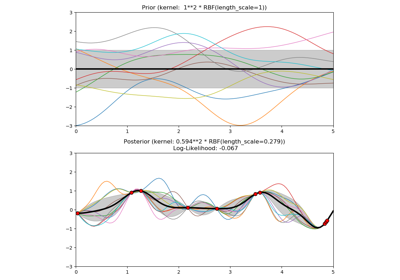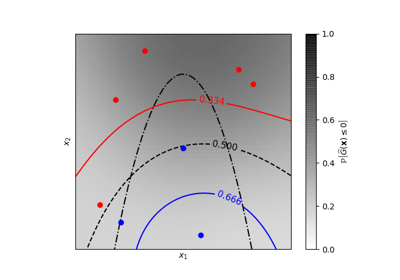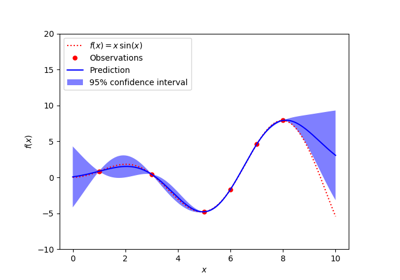sklearn.gaussian_process.kernels.ConstantKernel¶
-
class
sklearn.gaussian_process.kernels.ConstantKernel(constant_value=1.0, constant_value_bounds=(1e-05, 100000.0))[source]¶ Constant kernel.
Can be used as part of a product-kernel where it scales the magnitude of the other factor (kernel) or as part of a sum-kernel, where it modifies the mean of the Gaussian process.
k(x_1, x_2) = constant_value for all x_1, x_2
New in version 0.18.
Parameters: - constant_value : float, default: 1.0
The constant value which defines the covariance: k(x_1, x_2) = constant_value
- constant_value_bounds : pair of floats >= 0, default: (1e-5, 1e5)
The lower and upper bound on constant_value
Attributes: boundsReturns the log-transformed bounds on the theta.
- hyperparameter_constant_value
hyperparametersReturns a list of all hyperparameter specifications.
n_dimsReturns the number of non-fixed hyperparameters of the kernel.
thetaReturns the (flattened, log-transformed) non-fixed hyperparameters.
Methods
__call__(self, X[, Y, eval_gradient])Return the kernel k(X, Y) and optionally its gradient. clone_with_theta(self, theta)Returns a clone of self with given hyperparameters theta. diag(self, X)Returns the diagonal of the kernel k(X, X). get_params(self[, deep])Get parameters of this kernel. is_stationary(self)Returns whether the kernel is stationary. set_params(self, \*\*params)Set the parameters of this kernel. -
__call__(self, X, Y=None, eval_gradient=False)[source]¶ Return the kernel k(X, Y) and optionally its gradient.
Parameters: - X : array, shape (n_samples_X, n_features)
Left argument of the returned kernel k(X, Y)
- Y : array, shape (n_samples_Y, n_features), (optional, default=None)
Right argument of the returned kernel k(X, Y). If None, k(X, X) if evaluated instead.
- eval_gradient : bool (optional, default=False)
Determines whether the gradient with respect to the kernel hyperparameter is determined. Only supported when Y is None.
Returns: - K : array, shape (n_samples_X, n_samples_Y)
Kernel k(X, Y)
- K_gradient : array (opt.), shape (n_samples_X, n_samples_X, n_dims)
The gradient of the kernel k(X, X) with respect to the hyperparameter of the kernel. Only returned when eval_gradient is True.
-
bounds¶ Returns the log-transformed bounds on the theta.
Returns: - bounds : array, shape (n_dims, 2)
The log-transformed bounds on the kernel’s hyperparameters theta
-
clone_with_theta(self, theta)[source]¶ Returns a clone of self with given hyperparameters theta.
Parameters: - theta : array, shape (n_dims,)
The hyperparameters
-
diag(self, X)[source]¶ Returns the diagonal of the kernel k(X, X).
The result of this method is identical to np.diag(self(X)); however, it can be evaluated more efficiently since only the diagonal is evaluated.
Parameters: - X : array, shape (n_samples_X, n_features)
Left argument of the returned kernel k(X, Y)
Returns: - K_diag : array, shape (n_samples_X,)
Diagonal of kernel k(X, X)
-
get_params(self, deep=True)[source]¶ Get parameters of this kernel.
Parameters: - deep : boolean, optional
If True, will return the parameters for this estimator and contained subobjects that are estimators.
Returns: - params : mapping of string to any
Parameter names mapped to their values.
-
hyperparameters¶ Returns a list of all hyperparameter specifications.
-
n_dims¶ Returns the number of non-fixed hyperparameters of the kernel.
-
set_params(self, **params)[source]¶ Set the parameters of this kernel.
The method works on simple kernels as well as on nested kernels. The latter have parameters of the form
<component>__<parameter>so that it’s possible to update each component of a nested object.Returns: - self
-
theta¶ Returns the (flattened, log-transformed) non-fixed hyperparameters.
Note that theta are typically the log-transformed values of the kernel’s hyperparameters as this representation of the search space is more amenable for hyperparameter search, as hyperparameters like length-scales naturally live on a log-scale.
Returns: - theta : array, shape (n_dims,)
The non-fixed, log-transformed hyperparameters of the kernel




